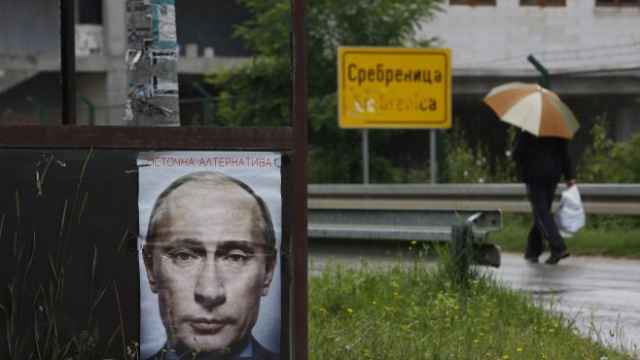UNITED NATIONS — A UN Security Council vote on a resolution to condemn the Srebrenica massacre as genocide, marking the 20th anniversary of the mass killing, was delayed several hours on Tuesday as Britain and the United States tried to convince Russia not to veto the commemoration, diplomats said.
Russia has deemed the British-drafted resolution unbalanced and does not want the 1995 massacre of 8,000 Muslim men and boys described as genocide. Instead it proposed condemning "the most serious crimes of concern to the international community."
A vote by the 15-member council had been scheduled for 10 a.m. (4 p.m. Moscow time), but was delayed until 3 p.m. (9 p.m. Moscow time) as talks between Britain, the United States and Russia continued on the draft, said diplomats.
When asked if Russia planned to veto, Russia's deputy United Nations Ambassador Vladimir Safronkov declined to comment.
A spokesman for the British UN mission said discussions "have gone right to the wire."
"Given the significance of the anniversary, we're committed to getting the broadest level of support from council members. We hope this delay will allow us to do so," he said.
On July 11, 1995, toward the end of Bosnia's 1992-95 war, Bosnian Serb forces swept into the eastern Srebrenica enclave, a UN-designated "safe haven." They executed 8,000 Muslim men and boys in the days that followed, dumping their bodies into pits.
Serbia acknowledges that a "grave crime" took place and adopted a declaration condemning the massacre in 2010 as it sought closer ties with the West, but stopped short of describing it as genocide.
Serbia warned earlier on Tuesday that the resolution would only widen ethnic divides in neighboring Bosnia.
A Message from The Moscow Times:
Dear readers,
We are facing unprecedented challenges. Russia's Prosecutor General's Office has designated The Moscow Times as an "undesirable" organization, criminalizing our work and putting our staff at risk of prosecution. This follows our earlier unjust labeling as a "foreign agent."
These actions are direct attempts to silence independent journalism in Russia. The authorities claim our work "discredits the decisions of the Russian leadership." We see things differently: we strive to provide accurate, unbiased reporting on Russia.
We, the journalists of The Moscow Times, refuse to be silenced. But to continue our work, we need your help.
Your support, no matter how small, makes a world of difference. If you can, please support us monthly starting from just $2. It's quick to set up, and every contribution makes a significant impact.
By supporting The Moscow Times, you're defending open, independent journalism in the face of repression. Thank you for standing with us.
Remind me later.





